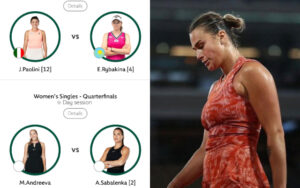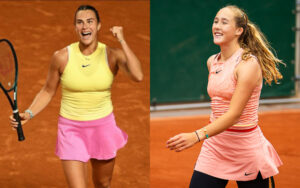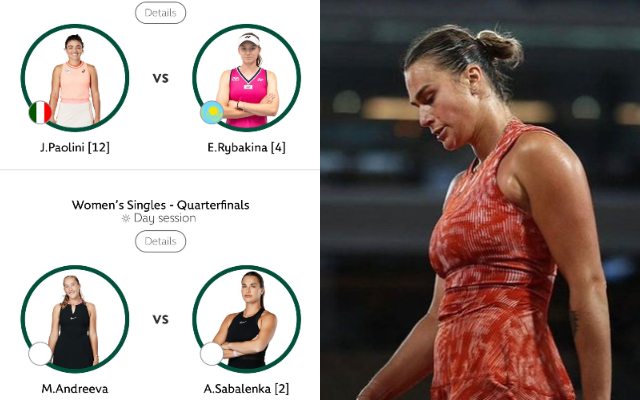
At the French Open 2024 Quarter Finals, World No. 2 and Rome Open runner-up Aryna Sabalenka will face Madrid Open quarter-finalist Mirra Andreeva. As they prepare to take centre stage at Court Philippe Chatrier today, it is noticeable that there is no flag beside their names. Sabalenka hails from Belarus and Andreeva from Russia. Some players have been assigned a white flag or no flag at all, a deliberate choice to represent neutrality for Russian and Belarusian tennis players competing in the event. This measure is a consequence of Russia’s invasion of Ukraine, with Belarus as a key staging area, resulting in sporting sanctions against its athletes.
The absence of a national flag is a poignant reminder of how politics can intrude into the realm of sports, affecting the lives and careers of athletes. For any sportsperson, representing their country at Grand Slam events is a moment of immense pride. However, players like Sabalenka and Andreeva are deprived of this privilege due to geopolitical conflicts beyond their control.
For Sabalenka, who won the Australian Open this year, not being able to proudly display her country’s flag is particularly disheartening. Despite achieving one of the highest honours in tennis, she cannot experience the full pride and joy that comes with national representation. This scenario evokes complex emotions. On one hand, there is the pride of personal achievement; on the other, a deep sense of loss for not being able to celebrate that victory under one’s national banner.
Similarly, Mirra Andreeva, a rising star in the tennis world, finds herself in the same predicament. Playing some of her best tennis this year, Andreeva’s remarkable journey to the quarter-finals of Roland Garros at just 17 years old should be a moment of national celebration. However, the absence of her country’s flag overshadows this achievement, reflecting the wider political tensions that have unfairly encroached upon her career.
The emotional toll on these athletes is significant. Representing one’s country on such a big global stage is not just about pride but also about identity and belonging. The forced neutrality can create a feeling of isolation, making their victories seem less complete. It underscores how the intersection of sports and politics can be profoundly unjust, punishing athletes for circumstances beyond their control.
For the Latest Sports News: Click Here

Sports, ideally, should be a realm where politics does not intrude. The essence of sport lies in fair competition, mutual respect, and the celebration of human potential. When politics disrupt this, it not only affects the athletes but also the spirit of sport itself. Sabalenka and Andreeva, through no fault of their own, are caught in the crossfire of international politics, making their achievements bittersweet.
Previewing the match, Aryna Sabalenka played her first match of the fortnight without a closed roof over her head. She met 22nd seed Emma Navarro in the fourth round, marking her first clash of the tournament with a top 80 opponent, and eased past her, 6-2, 6-3, avenging this year’s Indian Wells loss. Sabalenka has won all four matches in straight sets and has not dropped more than two games in six of those eight sets, including decisive victories over Paula Badosa and Erika Andreeva. This marks her ninth career Grand Slam quarterfinal (8-0), and her second at Roland Garros (2023, SF). While she successfully defended her Australian Open crown at the start of this season, Sabalenka has not won any other title in the last 12 months. Coming into Paris with runner-up finishes in Madrid and Rome, she is eager to prove her point.
Mirra Andreeva, for the second year in a row, is making waves at Roland Garros. The 17-year-old made her professional Grand Slam debut at this tournament last year with a third-round finish and has now gone two steps further to reach her first Major quarterfinal. She defeated former semifinalist Victoria Azarenka, 6-3, 3-6, 7-5, in the second round for her lone three-setter so far, and subsequently overcame Rabat champion Peyton Stearns and Frenchwoman Varvara Gracheva. This accomplishment secures her a Top 30 debut and her fourth career quarterfinal. Notably, Andreeva is the youngest women’s quarterfinalist at Roland Garros since 2005. However, she has lost all three of her last-eight matches on tour this year in straight sets.
In head-to-head encounters, Aryna Sabalenka leads 2-0 after prevailing over Andreeva in Madrid in both 2023 and 2024 in straight sets. Despite these challenges, Andreeva, who will be the second member of her family to meet Sabalenka in two weeks, holds a 2-1 record against top 10 players this season.
Sports transcends politics, uniting people across borders. Today, the French crowd will cheer for both a Russian and a Belarusian, highlighting the unifying power of sports. Despite not having a flag beside their names, Sabalenka and Andreeva have played superb tennis so far, and there is no reason why today’s match will be any different.
Also Read: Sinner assumes No. 1 ranking as Djokovic departs Paris under injury cloud




